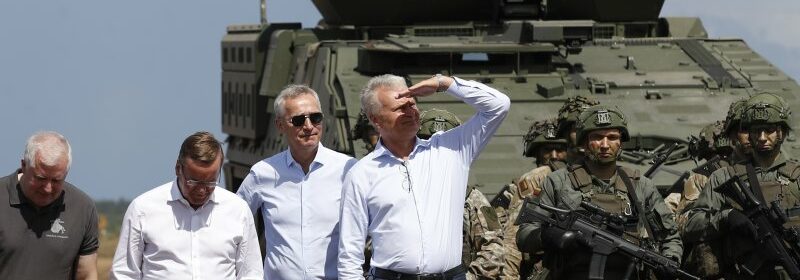Germany offers to ‘permanently station’ troops in Lithuania to strengthen NATO’s eastern flank

Save articles for later
Add articles to your saved list and come back to them any time.
Berlin: Germany is willing to send around 4000 troops to Lithuania on a permanent basis to strengthen NATO’s eastern flank, German Defence Minister Boris Pistorius said during a visit in the Lithuanian capital of Vilnius on Monday.
“Germany is prepared to permanently station a robust brigade in Lithuania,” Pistorius said. He said infrastructure and facilities will need to be created to accommodate the soldiers and their families.
From left, Lithuanian Defence Minister Arvydas Anusauskas, German Defence Minister Boris Pistorius, NATO Secretary General Jens Stoltenberg and Lithuania’s President Gitanas Nauseda in Lithuania.Credit: AP
In response to Russia’s invasion of Ukraine early last year, the German government pledged last June to have a combat brigade ready to defend Lithuania in the event of an attack, German news agency dpa reported.
Until now, however, there have been differences over whether the soldiers should be permanently stationed in Lithuania or only sent there temporarily for exercises. The Lithuanian government has demanded a permanent presence, while the German government for a long time was very reluctant to do that.
Pistorius explained the German government’s decision to offer the brigade to Lithuania was not only because of Russia’s war on Ukraine, but also because of Germany’s own history, saying that until the end of the Cold War, Germany was the country on NATO’s eastern flank.
Two Leopard 2 tanks are seen in action during a visit of German Defence Minister Boris Pistorius at the Bundeswehr tank battalion 203 at the Field Marshal Rommel Barracks in Augustdorf, Germany.Credit: AP
“We were the ones who could always rely on our NATO partners to stand by us in an emergency and to stand up and fight with us for our freedom and security in Germany,” he said. Now, Poland and the Baltic countries are particularly exposed, he said.
“We as the Federal Republic of Germany explicitly acknowledge our responsibility and our obligation as a NATO member state, as the largest economy in Europe, to stand up for the protection of the eastern flank,” Pistorius said.
Germany’s announcement comes as Polish officials said they were tightening security along its border with neighbouring Belarus in response to the announcement that Yevgeny Prigozhin, the leader of a short-lived mutiny in Russia, would move there, the New York Times reported.
Prigozhin’s location was still unknown as of Tuesday AEST.
Lithuanian President Gitanas Nauseda welcomed the announcement and said his country wants to build up the needed infrastructure by 2026.
“We have a strong political willingness in Lithuania to find the necessary financial resources to be able to finance the infrastructural needs,” Nauseda said after meeting with Pistorius and NATO Secretary-General Jens Stoltenberg.
Stoltenberg also welcomed Germany’s announcement and praised the country for its leadership and dedication to helping support the organisation’s collective defence strategy.
Germany’s military, the Bundeswehr, has already been present in Lithuania, which borders Russia and Belarus, for six years with several hundred soldiers.
There, Germany leads a NATO battlegroup with currently about 1600 soldiers, including about 780 from the Bundeswehr, dpa reported.
It was not immediately clear what would happen to this unit when the new German brigade is stationed in Lithuania.
AP
Get a note directly from our foreign correspondents on what’s making headlines around the world. Sign up for the weekly What in the World newsletter here.
Most Viewed in World
From our partners
Source: Read Full Article

